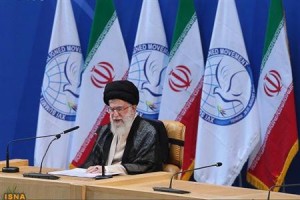 Under his slogan resistance economy, the Supreme Leader has called on the heads of the three branches of Government to co-operate for a quick solution of Irans economic difficulties.
Under his slogan resistance economy, the Supreme Leader has called on the heads of the three branches of Government to co-operate for a quick solution of Irans economic difficulties.Ayatollah Khamenei met President Rouhani, Speaker of Parliament Ali Larijani, and head of judiciary Sadegh Amoli Larijani on Tuesday. He told the men:
If the comprehensive policies of economic resistance are pursued and implemented seriously, there is a lot of hope that economic growth and reforming the countrys economic foundations will be resolved in fulfilling and resolving parts of the peoples problems.
The trend of implementing the broad policies of economic resistance must continue as a constant and unstoppable movement until achieving results .
If implementing the broad policies of economic resistance necessitates setting aside some unfavorable laws, the Parliament must identify, and then eliminate them. Also, if implementing these policies require the elimination of some regulations , the administration must undertake these measures by issuing resolutions.
In part, the Supreme Leaders proclamation of a resistance economy with emphasis on an increase indigenous production and exports has been a defiant response to the threat of Western sanctions.
However, this weeks statements, putting forth a 13-point program, also appear to be a recognition of the extent of Irans economic difficulties, blaming the policies of the Ahmadinejad Government from 2005 to 2013.
Last September, to encourage the Supreme Leader to accept his economic approach and nuclear negotiations with the US and other powers, Rouhani presented Ayatollah Khamenei with a dossier detailing the critical state of the economy.
Although there has been some improvement in Irans position since then, with inflation falling from its level of more than 40% when Rouhani took office, the economy is still contracting. Senior Presidential advisor Mohammad-Baqer Nobakht said that, after a 5.8% decline in 2013, the Islamic Republics economy is shrinking by 2%.
The Rouhani Government has set a goal of near-zero growth by the end of the 2014/2015 Iranian year.
The President said on Tuesday, in a speech in southern Iran, that the chain of unjust and cruel sanctions on the Islamic Republic must be broken.
(Hat tip to Iran Tracker for translation)
Government to Limit Support Payments in Ahmadinejads Subsidy Cuts Program
Trying to limit the cost of the subsidy cuts program, Economy Minister Ali Tayyebnia has said that support payments will now be given only to families who demonstrate financial need.
The Ahmadinejad Government, when it launched the flagship program in December 2010, authorized a monthly payment of $45 per person to cover price rises in areas such as food and energy.
The program has proven so expensive that some analysts say the support payments are greater than the Government revenues from the subsidy cuts.
Tayyebnia told reporters that applicants have until the end of the Iranian year (March 21) to file for the support payments.
Supreme Leaders Top Advisor: No Discussion of Missiles in Nuclear Talks
Ali Akbar Velayati, the Supreme Leaders senior foreign policy advisor, has again declared that nuclear talks with the 5+1 Powers cannot consider Irans missiles.
Velayati said the missiles are essential for deterrence of military threats, while reassuring that Iran will never pose a danger to the security of any country.
As talks on a comprehensive nuclear deal opened in Vienna last week, Iranian officials made clear that the agreement must be strictly on nuclear facilities and uranium enrichment, rather than trying to cover the state of Tehrans military capabilities.
Iran Ambassador Denies Arms Sales to Iraq
Irans Ambassador to Iraq, Hassan Danayeefar, has denied that Tehran has signed a deal to supply arms and ammunition to Baghdad
Danayeefar said, No agreement on military and arms cooperation has been endorsed with the Iraqi side thus far.
The envoy declared that the Iraqi Government has not asked for the weapons; however:
If the Iraqis feel a need and make a request, we will study it to see if we will be able to supply with such cargoes or not.
If the Iraqi government raises any such demand to control and fight terrorism, which is every countrys duty responsibility today, we will be ready to consider it.
Reuters, citing documents, reported on Monday that Iran and Iraq signed eight contracts worth $195 million in November.
By EA WorldView
The Iran Project is not responsible for the content of quoted articles.










